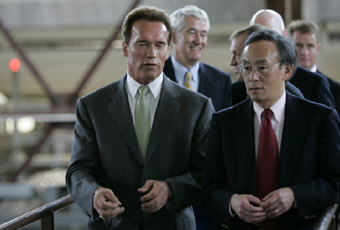Gov. Schwarzenegger to Ask for Calit2 Operating Funds in Research and Innovation Initiative
Sacramento, CA, December 27, 2006 -- Governor Arnold Schwarzegger today announced that he will propose nearly $95 million in the state budget to create the Governor's Research and Innovation Initiative, including $19.8 million in operating-budget support from California's General Fund for Calit2 and three other California Institutes for Science and Innovation (CISI).
|
According to a news release from the Governor's office, "this initiative provides funding for major projects that will grow California's economic strength in key innovation sectors, including cleantech, biotech and nanotech. The proposal also reaffirms California's position as a world leader in advanced research and innovation that creates jobs while preserving the environment."
"With some of the world's finest universities and research institutions, the Golden State has more scientists, engineers and researchers and invests more on research and development than any other state," said Governor Schwarzenegger. "As a leader in developing new technologies, California will reap tremendous rewards for our economy and environment from this investment in our innovation infrastructure."
Calit2 director Larry Smarr was the only CISI leader quoted in today's release. "California is home to 20 percent of the technology jobs in the country, with Californians producing 25 percent of all U.S. patents," said Smarr. "California receives the most venture capital dollars in the world, makes the biggest investments in clean energy technology, and produces the most biotechnology revenues -- all a result of the strong innovation partnership between universities, the private sector, and our state. This unique combination has given birth to Silicon Valley in Northern California, Wireless Valley in Southern California, and is beginning to create new industries of solar power, bio-fuels, broadband, and nanotechnology throughout the state. I believe Governor Schwarzenegger's investment in the University of California and its Institutes for Science and Innovation shows the leadership we need to maintain our state's economic growth, while improving our citizens' quality of life."
In announcing the support for CISI, the Governor's office noted that "these pioneering institutes bring the world's finest researchers together to find solutions to our greatest medical and technological challenges and position California at the forefront of research, innovation and jobs. Since inception, they have generated more than $1 billion from private and federal sources, dwarfing the state's $400 million initial investment." The news release also quoted Charles M. Vest, President Emeritus of the Massachusetts Institute of Technology and president-elect of the National Academy of Engineering, as saying that Calit2 "has collected the best team of research professionals anywhere in the country." Vest recently was part of a committee of experts who undertook a five-year review of Calit2 activities on behalf of the University of California Office of the President, the first such review of a CISI.
"It's clear that Governor Schwarzenegger supports research and innovation as the source of this competitiveness and will do what it takes to ensure California remains center-stage in our increasingly complex global marketplace," said Robert C. Dynes, president of the University of California. "When the Governor included funding in this coming year's budget to support the multidisciplinary research efforts of the Institutes for Science and Innovation at the University of California, he sent the strong message that the best and the brightest should work, study, and create here in California."
Apart from the operating funds for CISI institutes, which will be part of his proposed budget that will be unveiled in January, other major components of the Governor's Research and Innovation Initiative include:
Helios Project
The Governor's budget provides $30 million in lease revenue bonds for the Helios Project, a groundbreaking initiative by the University of California's Lawrence Berkeley National Laboratory to create sustainable, carbon-neutral sources of energy. The Helios Project will produce the next generation of super-efficient solar energy technology that will help reduce greenhouse gases and our oil dependency. The Helios Project's four goals are 1) generate clean sustainable alternatives to hydrocarbon fuels; 2) develop new energy sources; 3) improve energy conservation; and 4) reduce greenhouse gas emissions. The $30 million will be used to build a new energy/nanotechnology research building for the Helios Project.
Energy Biosciences Institute
The Governor's budget provides $40 million in lease revenue bonds to the University of California for UC Berkeley or UC San Diego in the event that either wins a global competition for the British Petroleum (BP) Energy Biosciences Institute grant. (The UCSD Division of Calit2 is participating in UCSD's bid to bring the BP institute to San Diego.) These campuses were among only five universities in the world that were invited to compete for this $500 million grant to build and operate an Energy Biosciences Institute, which will be dedicated to long-term research into the production of alternative fuels. The Institute will focus on converting biomass materials into fuels, converting fossil fuels to energy with less environmental damage and maximizing oil extraction from existing wells in environmentally sensitive ways. To accelerate California's movement towards a clean fuel future, the University of California will dovetail the Institute's work with the Helios Project.
Petascale Supercomputer
The University of California leads the world in high-speed computer technology and is poised to debut the next generation of supercomputers. The Governor's budget provides the first $5 million increment in state matching funds to enhance the University of California's bid to build a $200 million Petascale computer. Lawrence Livermore National Laboratory, Lawrence Berkeley National Laboratory and UC San Diego are in the running for the Petascale computer. The Petascale computer, named for the speed at which it can process information, will be the most powerful computer in the world. It will provide an enormous competitive advantage to California businesses and universities, helping to attract the best students and faculty from around the world. The Governor's commitment of these funds will significantly enhance the University of California's bid for this groundbreaking project.
Related Links
Governor's Press Release
Media Contacts
Media Contact: Doug Ramsey, 619-379-2912, dramsey@ucsd.edu


